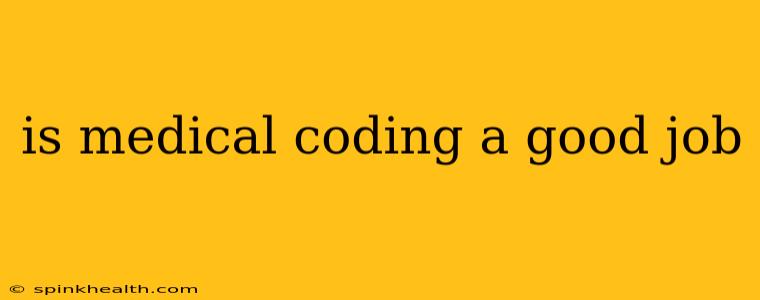Is Medical Coding a Good Job? A Deep Dive into the Field
The question, "Is medical coding a good job?" doesn't have a simple yes or no answer. It's a career path with its own unique blend of advantages and disadvantages, and whether it's a good job depends heavily on your individual personality, skills, and aspirations. Let's explore this fascinating field and unpack the realities of a medical coder's life.
My journey into understanding medical coding began with a chance encounter – a family friend who was a seasoned medical coder, spilling tales of her work. Her stories painted a vivid picture, far more nuanced than the simplified online descriptions. This article is born from that initial intrigue and years of research into the profession.
What Exactly Does a Medical Coder Do?
Medical coders are the unsung heroes of the healthcare system. They translate the complex medical terminology used by doctors and other healthcare providers into standardized numerical codes. These codes are then used for billing insurance companies, tracking patient diagnoses, and generating vital healthcare statistics. Think of them as the interpreters between the language of medicine and the language of finance. They're essential for accurate reimbursement and efficient healthcare data management.
Is Medical Coding in Demand?
Yes, the demand for medical coders is currently high and projected to remain so for the foreseeable future. The aging population, coupled with the increasing complexity of medical procedures and the ongoing shift towards electronic health records (EHRs), means that healthcare facilities consistently need skilled coders to manage the ever-growing volume of medical data.
What are the Pros of a Medical Coding Career?
- High Demand & Job Security: As mentioned earlier, the job market for medical coders is robust and expected to remain so for years to come. This translates to excellent job security and a good chance of finding employment.
- Relatively Accessible Entry: Unlike some healthcare professions requiring extensive and costly education, medical coding certifications can be obtained relatively quickly and affordably through various programs, making it a viable option for career changers or those seeking a quicker path to employment.
- Work-Life Balance Potential: Many medical coding positions offer flexible schedules, including remote work opportunities. This aspect can be particularly appealing to those seeking a better work-life balance.
- Good Salary Potential: While salaries vary based on experience, location, and certification, medical coders can earn a comfortable living, especially with increased experience and specialization.
- Intellectual Stimulation: Despite being detail-oriented, medical coding is not monotonous for those who find the intricate medical terminology and processes engaging. The constant learning and problem-solving aspects can provide intellectual satisfaction.
What are the Cons of a Medical Coding Career?
- High Level of Detail and Accuracy: Medical coding demands exceptional attention to detail and accuracy. One small error can have significant financial repercussions, requiring extreme focus and precision.
- Potential for Stress: The need for accuracy, coupled with strict deadlines and sometimes high volumes of work, can lead to stress.
- Repetitive Tasks: Some aspects of the job, particularly in high-volume settings, can feel repetitive, which can be monotonous for some individuals.
- Keeping Up with Changes: Medical coding standards and regulations are constantly evolving, requiring coders to regularly update their knowledge and skills through continuing education.
- Potential for Burnout: The meticulous nature of the work and the pressure to maintain accuracy can contribute to burnout if proper boundaries and self-care aren't maintained.
What Education and Training is Needed to Become a Medical Coder?
Several pathways exist, including associate degrees, certification programs, and on-the-job training. Certification is often preferred by employers, demonstrating a commitment to professional standards and knowledge.
How Much Do Medical Coders Make?
The average salary varies based on experience, location, and certification. However, a comfortable and respectable income is achievable, especially with experience and additional qualifications.
Is Medical Coding a Good Career for Someone Who Likes to Work Independently?
While some positions may allow for a degree of independent work, much of the job involves interacting with healthcare professionals and navigating organizational systems. The level of independent work will greatly depend on the specific job setting and employer.
Is Medical Coding a Good Career for Someone Who Likes to Help People?
While not directly patient-facing, medical coders play an indispensable role in ensuring accurate billing and data management, which directly impacts the financial health and efficient operation of healthcare facilities. Those with a desire to help people in an indirect but crucial way may find fulfillment in this career.
In conclusion, the question of whether medical coding is a "good" job is subjective. It's a field with both significant advantages and challenges. If you possess a strong attention to detail, enjoy working with data, appreciate the structure of a defined process, and are willing to commit to ongoing learning, then a medical coding career could be an excellent fit for you. However, if you thrive in fast-paced environments with constant variation or struggle with repetitive tasks requiring intense focus, you might want to explore alternative career paths. Thorough self-reflection and research are key to determining if medical coding aligns with your personal and professional aspirations.

